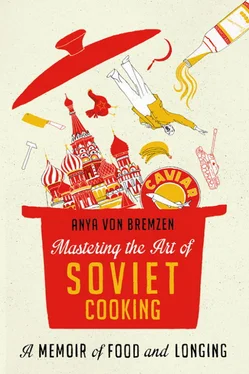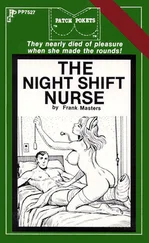Anya von Bremzen - Mastering the Art of Soviet Cooking
Здесь есть возможность читать онлайн «Anya von Bremzen - Mastering the Art of Soviet Cooking» весь текст электронной книги совершенно бесплатно (целиком полную версию без сокращений). В некоторых случаях можно слушать аудио, скачать через торрент в формате fb2 и присутствует краткое содержание. Город: New York, Год выпуска: 2013, ISBN: 2013, Издательство: Crown Publishers, Жанр: Биографии и Мемуары, Кулинария, на английском языке. Описание произведения, (предисловие) а так же отзывы посетителей доступны на портале библиотеки ЛибКат.
- Название:Mastering the Art of Soviet Cooking
- Автор:
- Издательство:Crown Publishers
- Жанр:
- Год:2013
- Город:New York
- ISBN:978-0-307-88683-5
- Рейтинг книги:5 / 5. Голосов: 1
-
Избранное:Добавить в избранное
- Отзывы:
-
Ваша оценка:
Mastering the Art of Soviet Cooking: краткое содержание, описание и аннотация
Предлагаем к чтению аннотацию, описание, краткое содержание или предисловие (зависит от того, что написал сам автор книги «Mastering the Art of Soviet Cooking»). Если вы не нашли необходимую информацию о книге — напишите в комментариях, мы постараемся отыскать её.
With startling beauty and sardonic wit, Anya von Bremzen tells an intimate yet epic story of life in that vanished empire known as the USSR—a place where every edible morsel was packed with emotional and political meaning.
Born in 1963, in an era of bread shortages, Anya grew up in a communal Moscow apartment where eighteen families shared one kitchen. She sang odes to Lenin, black-marketeered Juicy Fruit gum at school, watched her father brew moonshine, and, like most Soviet citizens, longed for a taste of the mythical West. It was a life by turns absurd, drab, naively joyous, melancholy—and ultimately intolerable to her anti-Soviet mother, Larisa. When Anya was ten, she and Larisa fled the political repression of Brezhnev-era Russia, arriving in Philadelphia with no winter coats and no right of return.
Now Anya occupies two parallel food universes: one where she writes about four-star restaurants, the other where a taste of humble
transports her back to her scarlet-blazed socialist past. To bring that past to life, in its full flavor, both bitter and sweet, Anya and Larisa, embark on a journey unlike any other: they decide to eat and cook their way through every decade of the Soviet experience—turning Larisa’s kitchen into a “time machine and an incubator of memories.” Together, mother and daughter re-create meals both modest and sumptuous, featuring a decadent fish pie from the pages of Chekhov,
(Stalin’s favorite Georgian stew), blini, and more.
Through these meals, Anya tells the gripping story of three Soviet generations—masterfully capturing the strange mix of idealism, cynicism, longing, and terror that defined Soviet life. We meet her grandfather Naum, a glamorous intelligence chief under Stalin, and her grandmother Liza, who made a perilous odyssey to icy, blockaded Leningrad to find Naum during World War II. We meet Anya’s hard-drinking, sarcastic father, Sergei, who cruelly abandons his family shortly after Anya is born; and we are captivated by Larisa, the romantic dreamer who grew up dreading the black public loudspeakers trumpeting the glories of the Five-Year Plan. Their stories unfold against the vast panorama of Soviet history: Lenin’s bloody grain requisitioning, World War II hunger and survival, Stalin’s table manners, Khrushchev’s kitchen debates, Gorbachev’s disastrous anti-alcohol policies. And, ultimately, the collapse of the USSR. And all of it is bound together by Anya’s passionate nostalgia, sly humor, and piercing observations.
Mastering the Art of Soviet Cooking













